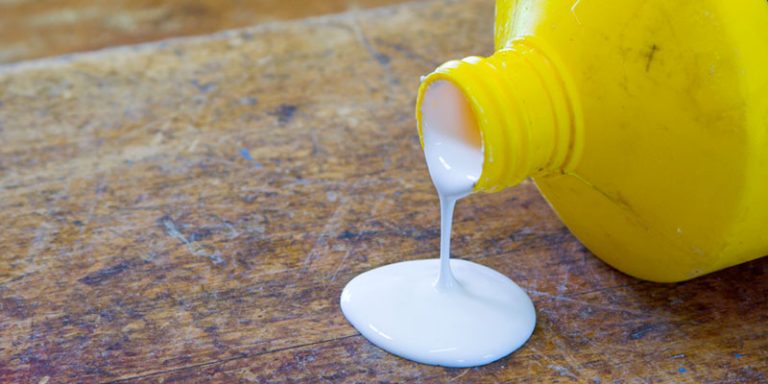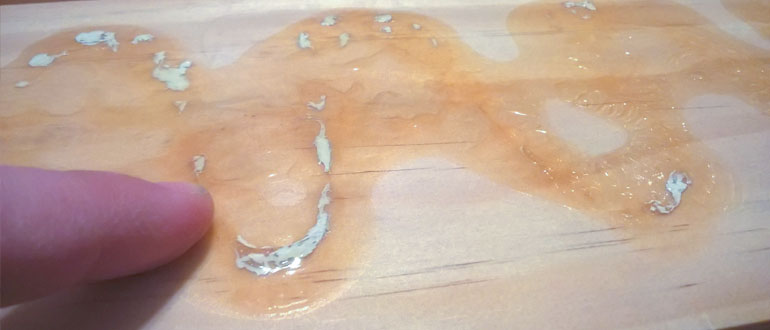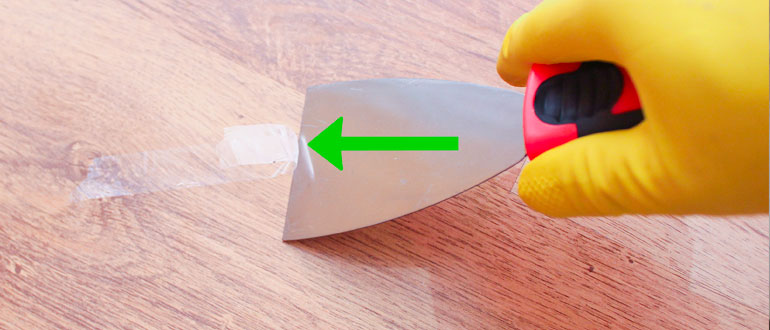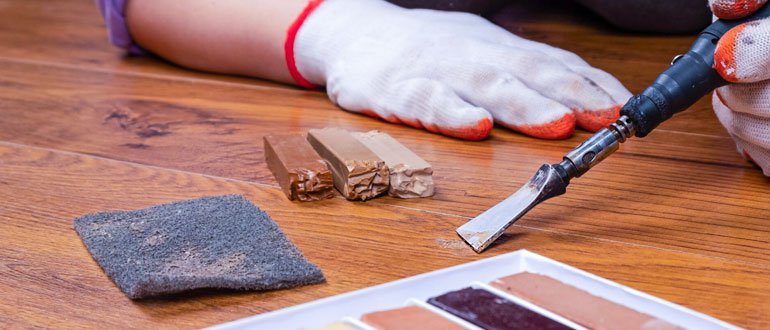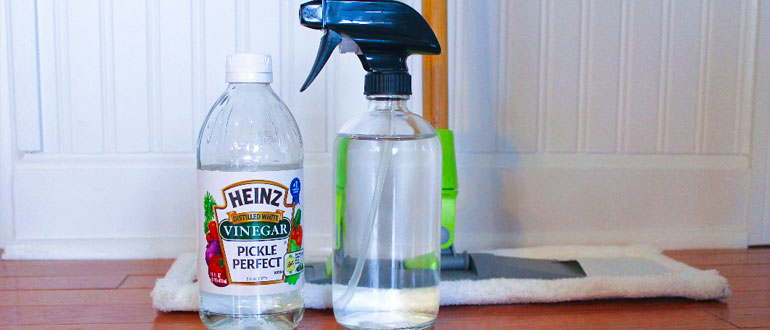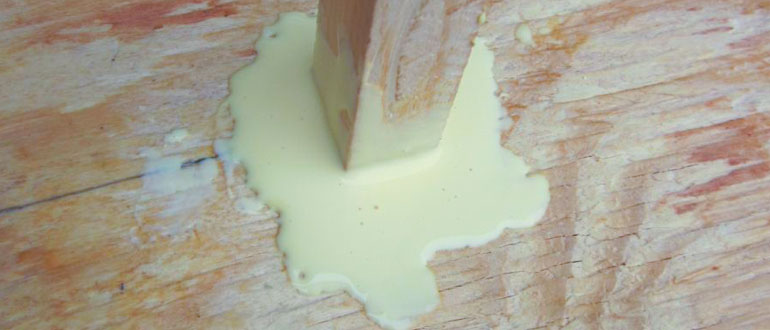Hardwood floors are a beautiful and durable flooring option for any home. But accidents that leave unwanted marks and residue can happen. One common problem is when the glue is accidentally spilled onto the hardwood floor during a DIY project or a home renovation. Removing glue from hardwood floors can be challenging.
Luckily, there are several effective methods for removing glue from hardwood floors without causing any harm to the surface. The key is to act quickly and use the right tools and products to avoid damaging the wood.
This article will explore some of the most effective methods for removing glue from hardwood floors. Whether you are dealing with a small spot or a large spill, we will guide you through step-by-step instructions to ensure that your hardwood floors are restored to their original beauty.
Preparing the Area
Before you begin removing the glue from your hardwood floors, it’s important to prepare the area properly to avoid any further damage to the wood. Here are some steps to follow:
- Clear the area: Remove any furniture or objects from the area to ensure that you have enough space to work on the floor.
- Cover any nearby surfaces: Use drop cloths or plastic sheets to protect nearby surfaces, such as walls or cabinets, from any damage from the glue remover.
- Ventilate the area: Open windows and doors or use a fan to create adequate ventilation in the area to prevent fumes from building up.
- Wear protective gear: Wear protective gloves and eye goggles to protect your skin and eyes from any harmful chemicals.
- Test the products: Before you begin removing the glue, test the products you plan to use on a small, inconspicuous area of the hardwood floor to ensure that it doesn’t cause any damage.
By following these steps, you can ensure that the area is properly prepared for removing the glue and that you avoid any unnecessary damage to your hardwood floors.
Gathering Tools and Supplies to Get the Glue Off Hardwood Floors
When it comes to removing glue from hardwood floors, it’s important to have the right tools and supplies on hand to make the job easier and more effective. Here are some of the essential tools and supplies you’ll need:
- Plastic scraper or putty knife: This will help you remove any excess glue from the surface of the hardwood floor.
- Solvent or glue remover: There are several options for glue remover, including mineral spirits, denatured alcohol, or adhesive removers specifically designed for hardwood floors.
- Clean rags or towels: These will help you wipe away the excess glue and solvent from the floor.
- Soft-bristled brush: This can be used to scrub away any stubborn glue residue.
- Sandpaper: If there is any remaining glue residue after using a solvent, you may need to sand the area lightly to remove it.
- Protective gloves and goggles: These will help protect your skin and eyes from any harmful chemicals.
- Ventilation: Ensure there is enough ventilation to allow fumes to escape, so work in a well-ventilated area.
By having these tools and supplies on hand, you can tackle the job of removing glue from your hardwood floors with confidence and ease.
The Most Effective Ways to Get the Glue Off Hardwood Floors
There are several effective ways to remove glue from hardwood floors, depending on the type of glue and the severity of the residue. Here are some of the most effective methods:
- Use vinegar: Mix equal parts of white vinegar and warm water in a bucket. Dip a clean cloth in the mixture and apply it to the glue. Let it sit for a few minutes, then use a plastic scraper or putty knife to gently remove the glue.
- Use baking soda: Mix baking soda with a small amount of warm water to make a paste. Apply the paste to the glue and let it sit for a few minutes. Use a plastic scraper or putty knife to remove the glue.
- Use mineral spirits: Soak a clean cloth in mineral spirits and place it on the glue. Let it sit for a few minutes, then use a plastic scraper or putty knife to gently remove the glue.
- Use denatured alcohol: Apply denatured alcohol to a clean cloth and place it on the glue. Let it sit for a few minutes, then use a plastic scraper or putty knife to remove the glue.
- Use adhesive remover: Choose an adhesive remover specifically designed for hardwood floors. Apply it to the glue according to the manufacturer’s instructions, and use a plastic scraper or putty knife to remove the glue.
- Use sandpaper: If there is any remaining glue residue after using a solvent, you may need to sand the area lightly to remove it.
Always, Remember to test any products or methods on a small, inconspicuous area of the hardwood floor first, and always wear protective gear when working with chemicals. By using these methods, you can effectively remove glue from your hardwood floors and restore their natural beauty.
Get Glue Off Hardwood Floors With Home Remedies
Several home remedies can be effective in removing glue from hardwood floors. Here are a few:
- Vinegar and water: Mix white vinegar and warm water in a bucket. Dip a clean cloth in the mixture and apply it to the glue. Let it sit for a few minutes, then use a plastic scraper or putty knife to remove the glue gently. Rinse the area with clean water and dry it thoroughly.
- Baking soda and water: Mix baking soda with a small amount of warm water to make a paste. Apply the paste to the glue and let it sit for a few minutes. Use a plastic scraper or putty knife to remove the glue. Rinse the area with clean water and dry it thoroughly.
- Salt and vinegar: Mix salt and white vinegar to make a paste. Apply the paste to the glue and let it sit for a few minutes. Use a plastic scraper or putty knife to remove the glue. Rinse the area with clean water and dry it thoroughly.
- Rubbing alcohol: Soak a clean cloth in rubbing alcohol and place it on the glue. Let it sit for a few minutes, then use a plastic scraper or putty knife to remove the glue. Rinse the area with clean water and dry it thoroughly.
Remember to test any home remedy on a small, inconspicuous area of the hardwood floor first, and always wear protective gear when working with chemicals. By using these home remedies, you can effectively remove glue from your hardwood floors using items you may already have at home.
Common Issues to Get the Glue Off Hardwood Floors
While removing glue from hardwood floors can be straightforward, some common issues may arise. Here are a few:
- Stubborn glue residue: In some cases, the glue may be particularly stubborn and difficult to remove. It can happen if the glue has been on the floor for a long time or is a powerful adhesive. If so, you may need a more aggressive method, such as sanding or a more potent solvent.
- Discoloration: Some glue removers or solvents may cause discoloration or damage to the hardwood floors. It can be prevented by first testing any product on a small, inconspicuous floor area and carefully keeping it neat with solvent and remover.
- Residue buildup: If the glue residue is not eradicated, it can build up over time and become more difficult to remove. It’s essential to thoroughly clean the area and remove all residue to prevent this from happening.
- Safety hazards: Many glue removers and solvents can be hazardous if misused. Always wear protective gear, work in a well-ventilated area, and follow the manufacturer’s instructions carefully.
- Damage to the hardwood floor: If you do not do the glue removal process carefully, it can cause damage to the hardwood floors. It can happen if too much pressure is applied or if a sharp object is used to scrape away the glue. Always use plastic scrapers or putty knives, and gently remove the glue.
Frequently Asked Question (FAQs)
Here are some frequently asked questions and answers about getting the glue off hardwood floors:
Q: Can I use a heat gun to remove glue from hardwood floors?
A: It’s not recommended to use a heat gun on hardwood floors, as it can cause damage and discoloration. It’s best to use a solvent or other method to remove the glue.
Q: Can I use a metal scraper to remove glue from hardwood floors?
A: No, it’s not recommended to use a metal scraper or any sharp object to remove glue from hardwood floors, as it can cause scratches and damage to the wood. Use a plastic scraper or putty knife instead.
Q: How long does it take to remove glue from hardwood floors?
A: The time it takes to remove glue from hardwood floors depends on the type and amount of glue, as well as the method used for removal. It can take anywhere from a few minutes to several hours, depending on the situation.
Q: Will removing glue from hardwood floors damage the finish?
A: If done properly, removing glue from hardwood floors should not damage the finish. However, it’s important to test any products or methods on a small, inconspicuous area first to ensure that it doesn’t cause damage or discoloration.
Q: Can I use a steam cleaner to remove glue from hardwood floors?
A: No, it’s not recommended to use a steam cleaner on hardwood floors, as the moisture can damage the wood and cause swelling or warping. Use a solvent or other method to remove the glue instead.
By being aware of the above, you have frequently asked questions about getting the glue off hardwood floors. You can follow the proper methods and instructions. So, You can successfully remove the glue without causing any damage or safety hazards.
Conclusion
In conclusion, Removing glue from hardwood floors can be tedious and sometimes challenging. But with the right tools, supplies, and techniques, you can do it effectively and safely. Home remedies like vinegar or baking soda can be effective for mild cases. In contrast, solvents and commercial glue removers may be necessary for more challenging adhesive types.
Additionally, Avoiding using hazardous chemicals damaging the hardwood floor is essential. You must always wear protective gear before doing the task. Besides, test products in a small inconspicuous area first to avoid unwanted damaging your hardwood floors.
Furthermore, It may be best to consult a professional to ensure proper removal without causing further damage. Following these guidelines, anyone can successfully remove glue from hardwood floors and restore the floor’s natural beauty.
You May Also Like To Read:
